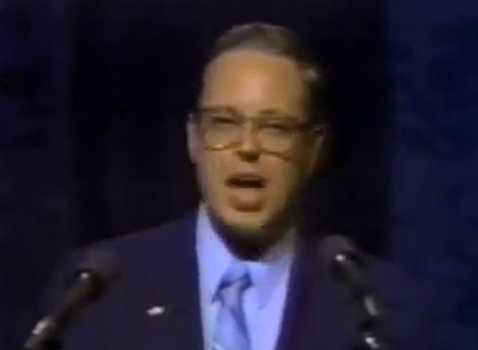
On this day, 237 years ago, the framers signed the Constitution in Philadelphia. Our founding document begins with those famous words, “We the People.” Though our nation has yet to achieve the aspiration in those words, we have the mechanism to do so: democracy. Voting. And fittingly, Sept. 17 is not just Constitution Day, it’s also National Voter Registration Day.
If you’re not registered to vote, please do so now. If you are registered to vote, it’s a good idea to check your registration, because not everybody wants you to vote. “I don’t want everybody to vote,” said Paul Weyrich, the founder of the Heritage Foundation, which has brought us Project 2025. He added, “Elections are not won by a majority of the people. They never have been from the beginning of our country, and they are not now. As a matter of fact, our leverage in the elections quite candidly goes up as the voting populace goes down.”
The “our” Weyrich refers to in this infamous quote was not Christians generally, but “our Christians,” the right kind of conservative Christian that supported his conservative, theocratic agenda. Today, we know them as Christian Nationalists.
Weyrich was something of a Christian Nationalist Forrest Gump – he was at the center of so many moments and organizations that have proved pivotal to the modern wave of Christian Nationalism our country is facing. He also christened the Moral Majority, which he co-founded with televangelist Jerry Falwell. Weyrich and his allies selected and popularized abortion as a wedge issue to mobilize a coalition that was collapsing after Brown v. Board desegregated public education. He founded ALEC, the American Legislative Exchange Council, to pump out regressive legislation in the states.
Weyrich admitted that he didn’t want people to vote at an event that is a reasonable historical marker for the genesis of the modern wave of Christian Nationalism: the National Affairs Briefing Conference in Dallas on Aug. 21, 1980. The audience included “laymen and several thousand preachers from 41 states … [a]lmost all white, middle-class,” according to The Washington Post, which also reported that the “two-day gathering … was really a fusion of Bible-thumping revivalist oratory with hardline New Right politics.” Phyllis Schlafly, Tim LaHaye, Pat Robertson and Falwell all spoke at the event, hosted by the Religious Roundtable. The entire purpose of this conference was to inject, in Weyrich’s words, “our Christians” and churches into politics, elections and government – to end the separation of church and state.
For Ronald Reagan, the twice-married Hollywood celebrity, this conference was a chance to ease some minds that might help him win the election, especially since he had signed a law protecting abortion when governor of California.
Just after Reagan took his seat on stage, D. James Kennedy introduced televangelist James Robison. Kennedy is one the grandfathers of modern Christian Nationalism and co-authored the influential book, What If America Were a Christian Nation Again?, which repeats many of the myths central to the Christian Nationalist identity.
Robison thundered from the podium as Reagan listened, “There is no possible way to separate God from government and have a successful government. God is the ultimate authority. I tire of the constant reference to Christians and religious people and the term ‘separation of church and state,’ implying that if you belong to a church or if you claim faith in God and believe in God you are to have no basic integral part in political activity or policy making.”
Let’s be clear: Separation of church and state has never been anti-religious, and one aspect of that separation is the ban on religious tests for public offices, which is also in our Constitution. Separation does not mean that religious people cannot hold public office – it means that nobody may abuse the powers of a public office to impose their personal religion on We the People. Separation of church and state is not anti-religious, it’s pro-religious freedom.
Robison continued to misinterpret the Constitution, remarking, “Neither our founding fathers nor Jesus Christ initiated the godless interpretation of separation of church and state as it is presently presented to so many American people. … We must begin to literally penetrate every area of our society – yes, even the political area.”
Reagan apparently agreed and he began by saying “I know this is a non-partisan gathering, and so I know that you can’t endorse me, but I only brought that up because I want you to know that I endorse you and what you’re doing.”
Then he directly attacked the constitutional separation too: “Under the pretense of separation of church and state, religious beliefs cannot be advocated in many of our public institutions — but atheism can. … When I hear the First Amendment used as a reason to keep traditional moral values away from policy making, I’m shocked. The First Amendment was written not to protect the people and their laws from religious values, but to protect those values from government tyranny.” Again, this is less a misunderstanding of the separation, than disinformation meant to attack our sole bulwark against Christian Nationalism.
This moment was the beginning of what was then called the New Right, what became the Religious Right and what is now Christian Nationalism. The men preaching on stage were Christian Nationalists attacking the separation of church and state, slandering it as anti-religious, and attacking our democracy. They didn’t want everyone to vote because they understood, even then, that if their Christian Nationalism poses a threat to democracy, democracy and church state separation are the cure for that extremism.
As Rob Boston said yesterday, “Chrisitan Nationalists hate democracy.” One of the best ways to fight Christian Nationalism is to register and vote.
Photo: Paul Weyrich addresses the National Affairs Briefing Conference in Dallas on Aug. 21, 1980. Screenshot from YouTube.